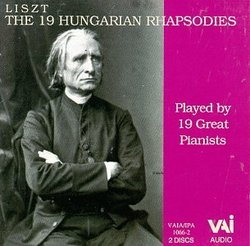| All Artists: Franz Liszt, Alexander Borovsky, György Cziffra, Mischa Levitzki, Ervin Nyiregyházi, Solomon Cutner, Earl Wild, Shura Cherkassky, Claudio Arrau, Jorge Bolet, Alfred Cortot, Malcolm Frager, Benno Moiseiwitsch, Guiomar Novaes, Sviatoslav Richter, Joseph Villa, Valery Bukrinski, Mark Hambourg Title: Liszt: 19 Hungarian Rhapsodies Played by 19 Great Pianists Members Wishing: 1 Total Copies: 0 Label: Video Artists Int'l Release Date: 10/24/1994 Genres: Special Interest, Classical Styles: Marches, Chamber Music, Historical Periods, Classical (c.1770-1830), Modern, 20th, & 21st Century Number of Discs: 2 SwapaCD Credits: 2 UPC: 089948106623 |
Search - Franz Liszt, Alexander Borovsky, György Cziffra :: Liszt: 19 Hungarian Rhapsodies Played by 19 Great Pianists
 | Franz Liszt, Alexander Borovsky, György Cziffra Liszt: 19 Hungarian Rhapsodies Played by 19 Great Pianists Genres: Special Interest, Classical
|
Larger Image |
CD Details |
CD ReviewsRhapsodic performances Allan Gotthelf | Pittsburgh, PA USA | 12/02/1999 (5 out of 5 stars) "[Minor editing of review originally written in December 1999. And I must remind readers that Amazon unfortunately omits paragraphing.] Gregor Benko and Ward Marston, two mavens of the rare and beautiful in piano (and other)music, have produced a gem. They offerwhat is in their view the best performance of each of Liszt's 19 Rhapsodies, with two constraints: (i) only one Rhapsody allowed per performer -- so 19 great pianists play 19 rhapsodies, and (ii) copyrights are honored (so that Horowitz's 6th is not available - but see below for why that's no problem.) Many of us love the Rhapsodies and don't need special pleading on their behalf, but for those who do, Benko and Marston urge a listen. They have made it a point to choose performances that avoid the easy or histrionic effect and stress the subtleties of the piece. Rhapsody No. 2 is thus played with the most delicate and subtle of touches and sensitivity by Moiseiwitsch. And Levitzki's 6th is incredibly gentle and beautiful. Also: meet Nyiregyhazi, he of the awesome sonority, in the dark No. 3 and a hundred others -- well 16 others from Bolet to Cherkassky to Cortot to Solomon to Cziffra, Novaes, Kentner, Richter, and Earl Wild, to lesser but powerful lights. Someone once said 'The key to life is attention to detail.' (Actually, that was I.) The attention to detail in this production -- not only in the performance of each piece, but also and especially in the way this 2 CD issue has been put together -- makes it a special listening experience. (The remastering is fine for 1994 - if you can't listen through the occasional hiss and inadequately recorded original, then you're doomed to miss out on much of the world's greatest pianism from 1899 through the 1940s, available these days on a torrent of CDs on an abundance of labels.) And you thought that was the good news. Well, it is, but even better is that Ward Marston, now with his own label -- Marston Records, intends to meet the promise in the liner notes of a follow-up issue --of close seconds -- e.g., Ignaz Friedman's 2nd Rhapsody. At least one listener can't wait." Piano magnificence Michael Rindt | 03/16/2002 (5 out of 5 stars) "It is sad to think that in this sterile, technologically advanced world of music we live in that people will so readily write off great performances because of less-than-modern recording capabilities. As for myself, I will take all the Cortot, Moiseiwitsch, Rosenthal, Rachmaninoff, Richter and Brailowsky (not all perform on this CD, but all can be found performing Rhapsodies) in a heartbeat before settling with some more recent "technologically sound" performances. I believe the liner notes are correct in saying that "Liszt never intended for any one performer to present all his Rhapsodies." This compilation is the perfect solution. Moiseiwitsch's performance of the Second makes me regret that the piece has become so hackneyed. His cadenza to it is wonderful! Cziffra's playing of the 16th Rhapsody is indicative of his own Gypsy connection and has some great improvisatory material. Nyiregyhazi, Wild, Frager, and Cortot all add to the outstanding quality of the performances here." The way to really hear these peices Charles R. Hall Jr. | 10/16/2004 (4 out of 5 stars) "After hearing Moiseiwitsch play the repeated notes in the first section faster and cleared than any performance I have ever heard, including Horowitz's own arrangement, I knew I was in for a treat. What followed is worth the price of the disc alone, Nzirehagzy playing the third making it sound as revered as late Beethoven. Another unexpected surprise was Joseph Villa's performance of the Carnval at Pest, easily the most difficult of the set, pulled off with apparent simplicity. The only unfortunate thing about this disc is the lack of Horowitz, though not the fault of the Producers. I also wondered, beyond Friedman, which is mentioned in the notes, how they could choose Levitsky over Gilels, which made me think that in some cases they were choosing antiquity over actual performance merits. But overall, this compilation finally serves these misunderstood pieces(which I was also quilty of writing off)"
|

 Track Listings (9) - Disc #1
Track Listings (9) - Disc #1